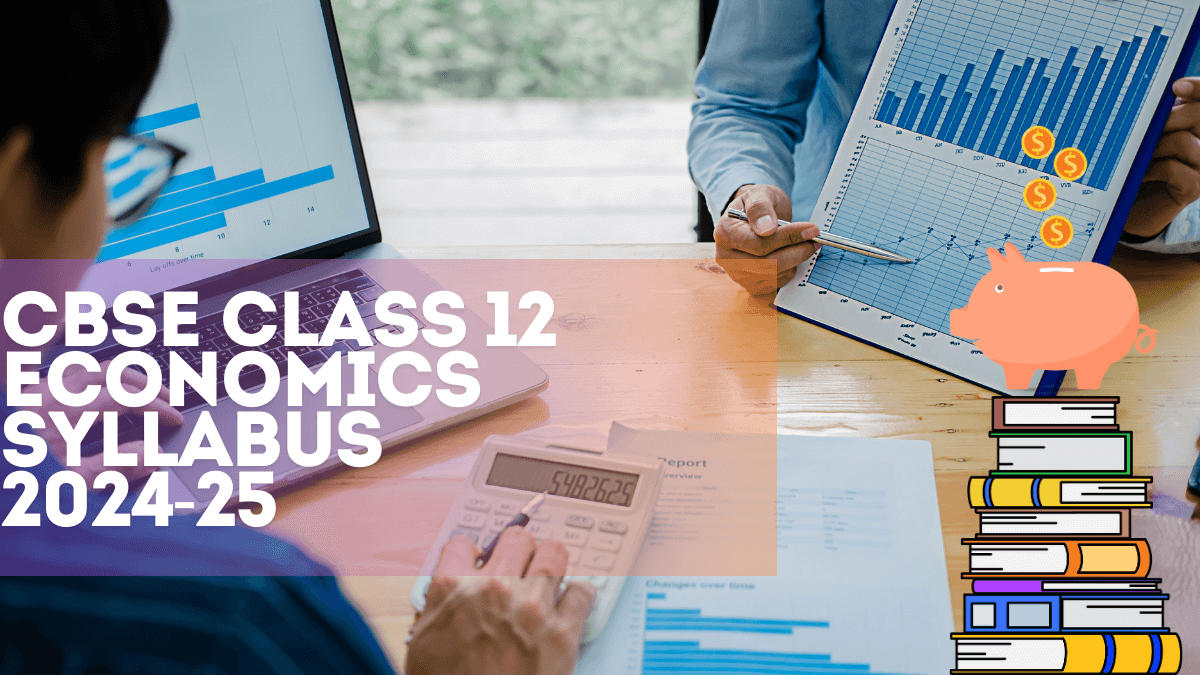The CBSE Class 12 Economics Syllabus 2024-25 is officially published by the Central Board of Secondary Education. The Class 12 Economics 2025 Syllabus is basically divided into 3 sections – Some introductory macroeconomics, Indian economic development, and project work.
CBSE Class 12 Economics Syllabus 2024-25
CBSE Class 12 Economics Syllabus 2024-25 of theory paper consists of two distinct parts. The Macroeconomics parts give knowledge about Introductory Macroeconomics, Government Budget and the Economy, National Income and Related Aggregates, Money and Banking, Determination of Income and Employment, and Balance of Payments.
The Indian Economic Development includes Development Experience (1947-90), Economic Reforms since 1991, Current Challenges Faced by the Indian Economy, Development Experience of India, economic Comparison with Neighbours, and other topics. These topics create a solid base for the students who want to do higher studied with economics subject.
CBSE Economics Syllabus 2024-25 Class 12: Overview
The CBSE Economics Theory paper carries a total of 80 marks, 40 marks asked from part A and 40 marks from part B. The project work is worth 20 marks.
| Units | Marks | Periods | |
| Part A |
Introductory Macroeconomics
|
||
| National Income and Related Aggregates | 10 | 30 | |
| Money and Banking | 6 | 15 | |
| Determination of Income and Employment | 12 | 30 | |
| Government Budget and the Economy | 6 | 17 | |
| Balance of Payments | 6 | 18 | |
| 40 | |||
| Part B |
Indian Economic Development
|
||
| Development Experience (1947-90) and Economic Reforms since 1991 | 12 | 28 | |
| Current Challenges facing Indian Economy | 20 | 50 | |
| Development Experience of India – A Comparison with Neighbours | 8 | 12 | |
| Theory Paper (40+40 = 80 Marks) | 40 | ||
| 200 | |||
| Part C | Project Work | 20 | 20 |
Class 12 Economics Paper Pattern 2025
CBSE Class 12 Economics paper 2025 is divided broadly into 3 parts. 55% of the economics question paper is based on understanding and concepts, 22.50% is on applying those, 18% of the paper is based on Analysing, Evaluating, and Creating.
| SN | Typology of Questions | Marks | Percentage |
| 1 | Remembering and Understanding: Exhibit memory of previously learned material by recalling facts, terms, basic concepts, and answers. Demonstrate understanding of facts and ideas by organizing, comparing, translating, interpreting, giving descriptions, and stating main ideas |
44 | 55% |
| 2 | Applying: Solve problems to new situations by applying acquired knowledge, facts, techniques and rules in a different way. |
18 | 22.50% |
| 3 | Analysing, Evaluating and Creating: Examine and break information into parts by identifying motives or causes. Make inferences and find evidence to support generalizations. Present and defend opinions by making judgments about information, validity of ideas, or quality of work based on a set of criteria. Compile information together in a different way by combining elements in a new pattern or proposing alternative solutions. |
18 | 22.50% |
| Total | 80 | 100% |
CBSE Class 12 Economics Syllabus 2024-25
Read the detailed CBSE Class 12 Economics Syllabus 2024-25 below –
Part A: Introductory Macroeconomics
Unit 1: National Income and Related Aggregates (30 Periods)
What is Macroeconomics?
Basic concepts in macroeconomics: consumption goods, capital goods, final goods, intermediate goods; stocks and flows; gross investment and depreciation.
Circular flow of income (two sector model); Methods of calculating National Income – Value Added or Product method, Expenditure method, Income method.
Aggregates related to National Income:
Gross National Product (GNP), Net National Product (NNP), Gross Domestic Product (GDP) and Net Domestic Product (NDP) – at market price, at factor cost; Real and Nominal GDP
GDP Deflator, GDP and Welfare
Unit 2: Money and Banking (15 Periods)
Money – meaning and functions, supply of money – Currency held by the public and net demand deposits held by commercial banks.
Money creation by the commercial banking system.
Central bank and its functions (example of the Reserve Bank of India): Bank of issue, Govt. Bank, Banker’s Bank, Control of Credit through Bank Rate, Cash Reserve Ratio (CRR), Statutory Liquidity Ratio (SLR), Repo Rate and Reverse Repo Rate, Open Market Operations, Margin requirement.
Unit 3: Determination of Income and Employment 30 Periods
Aggregate demand and its components.
Propensity to consume and propensity to save (average and marginal). Short-run equilibrium output; investment multiplier and its mechanism. Meaning of full employment and involuntary unemployment.
Problems of excess demand and deficient demand; measures to correct them – changes in government spending, taxes and money supply.
Unit 4: Government Budget and the Economy (17 Periods)
Government budget – meaning, objectives and components. Classification of receipts – revenue receipts and capital receipts;
Classification of expenditure – revenue expenditure and capital expenditure. Balanced, Surplus and Deficit Budget – measures of government deficit.
Unit 5: Balance of Payments (18 Periods)
Balance of payments account – meaning and components; Balance of payments – Surplus and Deficit
Foreign exchange rate – meaning of fixed and flexible rates and managed floating. Determination of exchange rate in a free market, Merits and demerits of flexible and fixed exchange rate.
Managed Floating exchange rate system
Part B: Indian Economic Development
Unit 6: Development Experience (1947-90) and Economic Reforms since 1991:
28 Periods
A brief introduction of the state of Indian economy on the eve of independence. Indian economic system and common goals of Five Year Plans.
Main features, problems and policies of agriculture (institutional aspects and new agricultural strategy), industry (IPR 1956; SSI – role & importance) and foreign trade.
Economic Reforms since 1991:
Features and appraisals of liberalisation, globalisation and privatisation (LPG policy); Concepts of demonetization and GST
Unit 7: Current Challenges Facing Indian Economy 60 Periods
Human Capital Formation: How people become resource; Role of human capital in economic development; Growth of Education Sector in India
Rural development: Key issues – credit and marketing – role of cooperatives; agricultural diversification; alternative farming – organic farming
Employment: Growth and changes in work force participation rate in formal and informal sectors; problems and policies
Sustainable Economic Development: Meaning, Effects of Economic Development on Resources and Environment, including global warming
Unit 8: Development Experience of India: (12 Periods)
A comparison with neighbours India and Pakistan
India and China
Issues: economic growth, population, sectoral development and other Human Development Indicators
Part C: Project in Economics 20 Periods
The discussion about projects is in the last part of the article.
Class 12 Economics Syllabus 2024-25 PDF
Students can download the Economics syllabus pdf from the given link in the box below. This CBSE Economics Syllabus PDF contains both the class 11 and class 12 economics syllabus, exam pattern, and other important information.
| PDF Download Link |
| |
CBSE Class 12 Economics Prescribed Books
The board has recommended these 5 listed Class 12 Economics books in their official syllabus pdf.
1. Statistics for Economics, NCERT
2. Indian Economic Development, NCERT
3. Introductory Microeconomics, NCERT
4. Macroeconomics, NCERT
5. Supplementary Reading Material in Economics, CBSE
Note: The above publications are also available in Hindi Medium.
CBSE Class 12 Economics Projects 2024-25
CBSE Class 12 Economics 2025 syllabus includes different project work. The objectives of the project works are discussed below.
- dig deeper into theoretical ideas learned in grades XI and XII.
- Analyze and evaluate real-world economic scenarios using theoretical frameworks and arguments.
- demonstrate their understanding of economic theory.
- Follow up on topics of interest in economics and improve communication skills for logical arguments. The project work expectations are as follows:
- Each academic session, learners will complete one project of 3,500-4,000 words (excluding diagrams and graphs), ideally handwritten. This project will be an autonomous, self-directed study.
Scope of the Economics Project
- Learners may work on the following lines as a suggested flow chart:
- Choose a title/topic Collection of the research material/data
- Organization of material/data Present material/data
- Analyzing the material/data for conclusion Draw the relevant conclusion
- Presentation of the Project Work









 CUET General Test Syllabus 2026 (Latest)...
CUET General Test Syllabus 2026 (Latest)...
 CUET Chemistry Syllabus 2026, Download O...
CUET Chemistry Syllabus 2026, Download O...
 CUET Agriculture Syllabus 2026, Exam Pat...
CUET Agriculture Syllabus 2026, Exam Pat...









